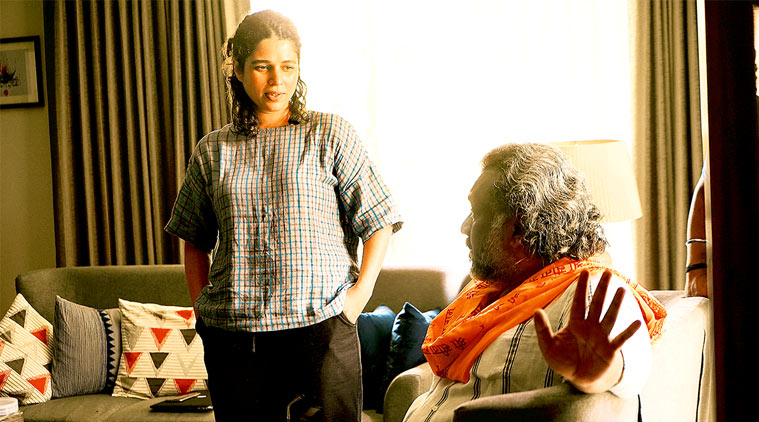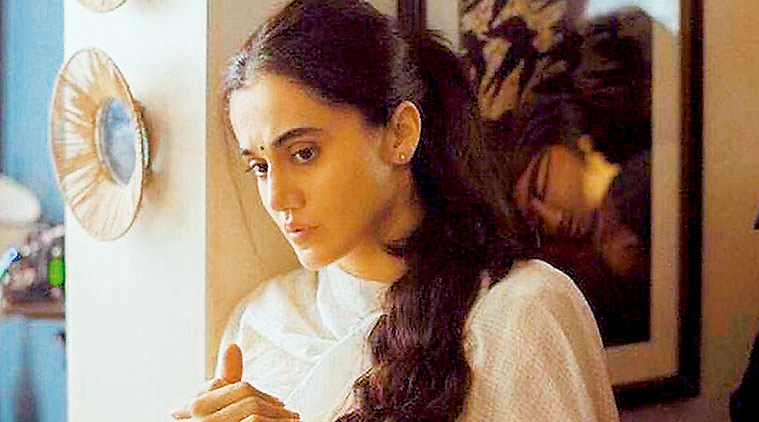 Mrunmayee Lagoo with Anubhav Sinha
Mrunmayee Lagoo with Anubhav Sinha
I USED to say she was more motherly to Salman Khan than she was to me,” chuckles Mrunmayee Lagoo, 36, as we talk about her mother, actor Reema Lagoo, who was Bollywood’s go-to mother in the late 1980s onwards. “That was a running joke between us,” she says. But it could well be true. After all, Lagoo has played the doting mother to Salman Khan and other leading men of Bollywood to perfection for decades.
But we are not here to talk to Mrunmayee only about her mother. She has just stepped out of a marathon writing-and-narration session. After the release of Thappad last week, the Taapsee Pannu-starrer she co-wrote with director Anubhav Sinha, she has been super busy. The idea and premise of the film, she says, was Sinha’s. “I had met Anubhav Sir while he was shooting Article 15 (2019). He narrated the idea to me in one line — that it’s about this housewife whose husband slaps her in front of everyone. I started writing the various characters and the separate worlds they came from. How Amrita (played by Pannu) and Vikram (played by Pavail Gulati) would be. I kept sending him stuff to read, and he would react to them. We spent a month discussing the arc of the film. Then he said, ‘Yeh ab pak gaya hai, ab likho isko’,” she says.
Thappad is Mrunmayee’s first mainstream Bollywood writing project. The film is a comment on patriarchy, male privilege and domestic violence through the story of Pannu’s character and those around her. “Many times, we don’t even realise how inherent patriarchy and male entitlement is. Dialogues like ‘Yeh gaadi lekar nikalti kyun hain’ is a thing that we have heard many men say every day about women driving. Or how if men get angry at work, they are passionate, if women get angry, we are shrill and hysterical,” she says. This is so ingrained in society that a man doesn’t need to be particularly evil to be thinking and saying these things. “We didn’t want to paint Vikram as an evil guy. He’s a regular guy in whom entitlement runs deep. When someone sees him, they can actually feel ‘Arre yeh toh main hun’. Besides, women, too, are enablers of patriarchy, they are complicit.”
 A still from Thappad
A still from Thappad
There has been a lot of chatter about the female gaze in the film. “I don’t think that only a female gaze is required for a story on women, but if it’s there, it adds a layer of reality. Men and women process things about the other gender in a different way. The way I would show a man going about his morning would perhaps be different as to how a man would depict another man going about his morning. When the two come together, it’s a collaboration. Chances are better that the narrative would be more real,” she says.
One would assume that with Reema Lagoo as her mother, Mrunmayee would have had insider access to Bollywood. But her mother had other plans for her, one which included her studying in a boarding school in the hill-station Panchgani. “I didn’t grow up in a typical filmy household. When I would come home for my vacations, my mother would make sure she had no shooting commitments. My mother had very early on established that films and filmmaking were a far cry from the glamourised version of things that we saw on screen,” says the writer, who grew up in Andheri where she still lives.
At home, the emphasis was on theatre, progressive writing and reading. It was a different world from the one Mrunmayee’s mother inhabited on screen. “Bollywood does very well with stereotyping. If you do one film well, then you are in that mould for life. But, thankfully, my mother also had a very strong presence in Marathi theatre, where she essayed strong women characters who didn’t fit into moulds. I straddled these two worlds with her. So even when I saw her in Hum Aapke Hain Koun..! (1994) and I loved every bit of it, I also saw her playing these superstrong women,” she says.
Writing is something that was always a part of Mrunmayee, but she never took it up as a calling. After her Bachelor’s of Mass Media degree from KC College, Mumbai, in the early 2000s, where she graduated in advertising, internships with advertising agencies followed. But nothing stuck. “Given my mother’s connections, I got some work as an actor in regional cinema. But it soon dawned on me that I am not a natural; I don’t face the camera as happily as people who are born to do it. I then ended up directing Jake’s Women, a play by Neil Simon and I felt more at home writing and directing it,” says Mrunmayee. She followed it by assisting Rajkumar Hirani on his blockbuster 3 Idiots (2009) and other successful films such as PK (2014), Talaash (2012) and Dangal (2016). “Being an AD was the best film school. I learnt on the job. But that stint also spelt out for me that direction was not my thing. Writing was where I revelled,” she says. In the meanwhile, Mrunmayee kept writing, things that could be used as samples to get her more work. She also started writing scripts. “I was always very drawn to complicated relationships, human complexities and failings,” says Mrunmayee.
These are interesting times in Bollywood, she says, with women characters being written to reflect the times we are living in. “The sheer black and white template is being broken. Characters are now temperamental, angry and vulnerable at the same time. Like Alia (Bhatt) in Gully Boy (2019), or even Shobhita (Dhulipala) in (the 2019 web-series) Made In Heaven. We have moved on from having absolute villains. People are products of circumstances,” adds Mrunmayee.